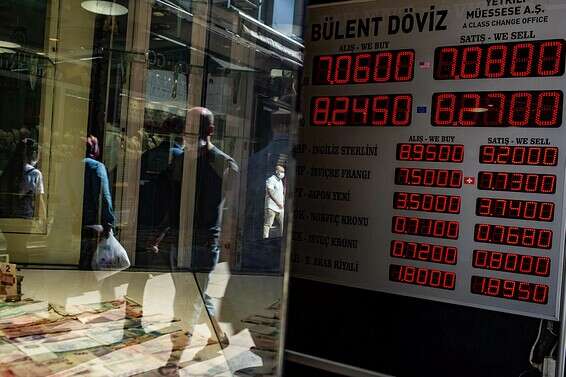Despite the economic crisis brought about by the corona and the extravagant policies led by the president's administration, support for it remained strong • The reason: turning the historic church into a mosque
The Feast of Sacrifice is one of the highlights of the year in all Muslim countries, but in Turkey it marks a new slump in the local economy: The Turkish lira lost more than 0.5% yesterday (Thursday) and stands at 7,006 pounds to one dollar - a situation it has not met since the peak of corona damage in mid-May. .
Turkey's economy is greatly affected by inbound tourism, and even after the end of the first wave in the country many tourists prefer neighboring Greece. Since the beginning of the year, in an attempt to stem the economic damage, the Central Bank of Ankara and the government boys have sold about $ 110 billion in an attempt to stop the avalanche that began even before the outbreak of the virus. However, the conduct of Turkish President Recep Tayyip Erdogan and the Minister of Economy and Finance, who is the husband of President Asra's daughter, Brat Albeirak, leads to a failure that pursues failure.
Erdogan: "Aya Sofia resurrection heralds the release of al-Aqsa"
Turkey threatens: "May start war on Greece"
The struggle against the Turkish "Tika" organization in Jerusalem
Research: Turkey and Europe fund civil society organizations in East Jerusalem
Proof of this is also the prolonged weakening of the pound against the euro. Last week the euro crossed the 8-pound mark for a single euro, for the first time since 2018. That has not stopped it and the euro is already at 8.27 pounds today. Also, the deficit created by the Erdogan government in recent years has only deepened with all sorts of different and weird ventures whose need is unclear.
One of the main ones is the issue of oil and gas exploration in the eastern Mediterranean, which has led to tensions with Greece and Cyprus alike. Another issue is the military adventure, culminating in Operation Spring of Peace in which Turkey has effectively created a buffer state between itself and Syria. The goal, ostensibly, was to eradicate Kurdish terrorist cells but factually - the goal was not really completed.
Most of Erdogan's Justice and Development's voices come from the weakening of the people and he avoids steps that are likely to hurt them - but they are the only ones that can curb extreme inflation. One of the steps required is to raise interest rates, and Erdogan opposes this.
While he may have various claims about it, the trauma from last year's heavy defeat in the local elections, as well as the positive political momentum of Justice and Development leavers Ali Ali Bajan and Ahmet Davutoglu, make Erdogan fear that if he hits his electoral centers of power - the votes will leave parties His opponents today.
In an editorial published by the Financial Times yesterday on the state of the Turkish economy, President Erdogan was severely criticized. "Erdogan cannot confuse basic economic laws," the article said, "The moves taken by Turkish President and son-in-law Albeirak are endangering Turkey's economy and its citizens." If you want to understand how detached the Turkish government is, you can get an example from what Al-Bayrak claimed last week: "The Turkish economy is stable, which indicates a return to trust in industry and consumers."
In an interview with the New York Times, a senior economist at Oxford University School of Economics said in an interview with the New York Times that the Turkish economy is expected to enter a real crisis, after the Turkish economy has been in recession since the summer of 2018. At the same time, a poll conducted by Reuters, with 42 economists from Turkey and abroad, indicated that Turkey's economy is expected to contract in 2020, for the first time in a decade.
It is highly doubtful that the current recession will also cause Erdogan and Albeirak to change their policies that are leading Turkey's economy backwards. Proof of this can be taken from the dismissal of former Turkish bank governor Murat Chetinkaya, who was fired in July last year - after the latter demanded beneficial economic measures. In his place was appointed Murat Oysal, whose lack of economic measures in his time indicates the level of his influence.
"The majority supports Erdogan"
"The economic downturn so far does not affect the Turkish street living on the basis of the Turkish pound and not on the basis of the dollar or the euro," Dr. Chai Eitan Cohen Inrojek, a modern Turkish researcher at the Jerusalem Institute for Strategy and Security and Tel Aviv University, told Israel Today. According to him, the lack of interest of the Turkish street in the current economic situation lies in the repeated transformation of the church Aya Sophia into a mosque.
"Turkish citizens are intoxicated," explains Dr. Cohen Inrojek, "most people support Erdogan, despite the economic problems." They do not think they have any other alternative. The source of the insistence on not raising interest rates lies in the Islamic point of view, and in the religious problematic nature of the issue for Erdogan. Also, the Bank of Turkey is no longer an independent body. "
On the other hand, there are still those who complain about the economic situation. The senior researcher says that "the stronger strata, senior industry figures for example, are the ones who complain about the situation because they are really affected by the situation. However, in any situation they are not the ones who support Erdogan." Dr. Cohen Inrojek concludes that "Erdogan is expected to present the economic situation as a consequence of turning Aya Sophia into a mosque, and will throw the responsibility on the countries of the world and their response to a move that 'bought' for him Islamist voices that could have moved to Babajan or Davutoglu."

